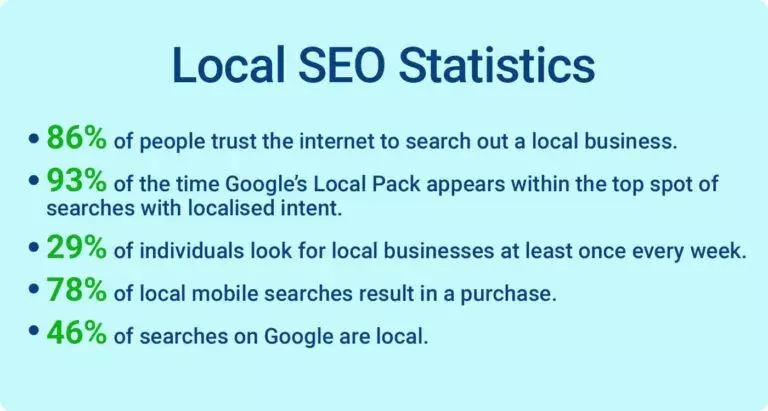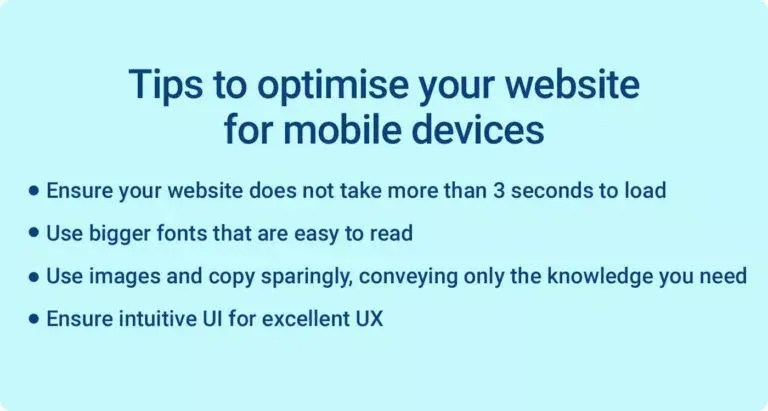Search engine optimisation (SEO) is a never-ending game of whack-a-mole for digital marketers, so it’s no wonder some tasks fall by the wayside.
Local SEO is on your to-do list, but it keeps getting on the back burner for some reason.
So what are some handy tips for local SEO solutions you can implement to boost your local search ranking?
We’ll review everything you wish to know to track your progress in 2025.
Why You Should Implement Local SEO:
Local SEO allows you to promote your business online to a local audience. Ranking your business in Google’s ‘Local Pack’ for your specific service will help attract local customers who are ready to buy.
The importance of Local SEO
When it involves local SEO, it isn’t all that different from organic SEO – keyword research, content, links, and on-page technical SEO. It just includes a local focus.
These elements are important to urge right for your website and its industry overall to outperform the competition within the SERPs.
However, when optimising for local search these parts contain more of a local focus on searches people are performing within the immediate area surrounding the business (e.g., local city names).
SEO as Part of a Wider Digital Marketing Picture
SEO isn’t just keywords, link building and technical work in the back end of your website. It’s also about using the proper practices as part of a wider digital marketing strategy. This includes creative content marketing across different platforms, including social media, and much, much more.
Here at Nautilus, our nerds have a track record of successfully boosting online presences. We’ve even been voted as one of the top B2B marketing agencies!
Other companies tend to take your money and do little for it, but we’re passionate about providing a fantastic service for our clients and we’re obsessed with winning. This means we work hard to make sure you’re happy with the service we provide.
We also offer a free SEO audit of your website to see how you can improve.

Local SEO Statistics
Outranking national brands in search results was once impossible in the world of SEO. Fortunately, Google gave local businesses a way to compete with the big guys in 2014.
In July 2014, Google rolled out the primary version of their Pigeon update, which gave local businesses the power to compete for search rankings on a local level. In short, Google began to offer a ranking boost to businesses near the searcher in location-specific searches (ex. “pizza near me”, “London contractors”, etc.).
Pigeon invited local businesses to the planet of search engines, and people who were paying attention made out.
- Nearly one-third of consumers within the UK use the internet to look for local businesses each day.
- 76% of individuals look for a business nearby visit within 24 hours.
- 18% of local searches lead to a purchase within 24 hours.
- 61% of mobile searchers are more likely to contact a local business if they need a mobile-friendly site.
- 76% of consumers trust online reviews as much as they trust personal recommendations.
- 86% of individuals search the location of a business on Google Maps.
- 50% of people search only on a smartphone.
- 40% of mobile website visitors will leave your site if it takes more than 3 seconds to load.
- Since 2017 searches including the terms “Where to buy” and “near me” have increased by 200%
Benefits of Local SEO:
Focusing your SEO on local markets takes your little fish status out of the large pond and plops you in a more realistically sized pool. Since most small businesses consider local consumers to grow, the benefits of this approach are undebatable.
If you’ve been asking yourself “Should I look into local SEO?”, then here are your reasons to begin.
- It improves local search online visibility
- Local shoppers love to recommend a top-notch business by giving good reviews, ultimately business with good local SEO will get more trustability and potential to get ranking higher
- It will make us stand out with local competitive business
- It builds a commutative channel toward local customers
- It generates more relevant web traffic
- It helps to gain more local repeat customers
- It builds trust and authority through higher ranking
- It reduces advertisement cost
- It Increases direct sales
A Comprehensive Guide to improve Local SEO
For a local business, it is often hard to compete with the large brands online, but if you’re strategic in your approach and have the proper tools, you’ll be able to easily improve your local SEO performance by growing the visibility of your brand and thus increase your sales.
Improving your local SEO means more website traffic, leads, and conversions since the strategy is more relevant to your base of local customers. Consider this focused strategy as to how to assist you to compete more effectively against larger national brands that have unlimited resources to spend.
By focusing on specific local-SEO to-dos, you can neutralise the advantage of larger brands that routinely optimise for broader keywords and rely on brand recognition, rather than value propositions, to increase traffic.
Here are the top 7 tips for making your local SEO successful:
1. Create a Google My Business Account:
Optimising your Google Business Profile is probably the foremost effective way to rank higher on Google Maps in addition to gaining visibility in Google Search local results. To get access to your business profile to create these optimisations, however, you need a Google My Business account related to that profile.
Once you provide all of the requested information in your Google My Business account dashboard, all information is going to be added to your Business Profile, which appears in Google Search local results, the Google Search Knowledge Panel, and Google Maps.
To optimise your Business Profile on Google, make sure that you:
- Create a Google My Business account and verify ownership of the business
- Provide accurate and up-to-date information
- Include your logo, working hours, payment methods, the product or service you sell, and images.
- Ask your customers to review your business online
- Give a proper response to customer reviews
- Publish posts related to announcing products, events, and special offers to your Business Profile using the Google My Business dashboard.
2. Engage in Social Media
Now more than ever, Google considers content shared on social media more important. After you have carved out an awesome looking Google My Business page, share the page on social media, further aligning social and search.
3. Optimise For Voice Search
Nowadays Voice search is growing rapidly and will also grow within the coming years. Therefore, in local SEO, it’s vital to optimise the way people ask questions when they speak into devices, as opposed to how they type out their searches.
People use more long-tail keywords when doing voice searches compared with regular searches. Due to this, you’ll even have to regulate the SEO of your content to suit the more conversational tone of somebody speaking. As an example, you’ll need to add normal question starters like who, what, when, where, why, and how.
It’s also crucial to think about user intent when optimising for voice, as these searches are most frequently performed when the user needs a particular piece of information.
4. Get More Reviews from Your Customers
Getting your customers to write good reviews for your business doesn’t just optimise your Google My Business presence; it also encourages more local customers to shop from you. According to the BrightLocal’s Local Consumer Review Survey 2017 reveals that 85% of consumers believe online reviews as much as personal recommendations.
Here are some tips to encourage customers to leave reviews:
- Ask for a review in person after closing
- Send a post-purchase email or text asking customers to write down a review (make sure you’re not approaching dissatisfied customers)
- Respond to existing reviews professionally, thanking reviewers and addressing complaints in not so favourable reviews.
5. Optimise Your Website for Mobile Devices
A 2018 Stone Temple study that checked out 2017’s mobile vs. desktop trends found that the shift to mobile is going on faster than expected. Mobile visits to websites grew from 57% in 2016 to 63% in 2017, and therefore the overall visits to websites from desktop shrunk from 43% in 2016 to only 37% in 2017
Another 2017 study from Acquisio determined that traffic from local searches is often especially lucrative, with a noteworthy 75% of all mobile searches that exhibit local intent producing in-store, offline visits within 24 hours.
This confirms that you just need to optimise your website for mobile to be a player in local SEO.
We use NitroPack to optimise our website and also our clients to achieve top page speeds!

6. Conduct Keyword Research and Add Relevant Keywords
Doesn’t it make sense that your keywords should be relevant to local customers?
Google’s Keyword Planner allows you to filter keyword searches based on the location you want to target, and you will get an idea of the popular search terms for a given region. This allows you to create a list of locally relevant keywords to target. Once you’ve got them, they must make appearances in your site’s meta content, copy, and URLs.
Also, include mentions of region-specific landmarks and hotspots in your content. As an example, if your local restaurant serves dinner in downtown Seattle, include references to “dining by the Space Needle” or “just steps from the Space Needle” on your site.
7. Make Sure Your NAP Information is Consistent
You must make it easy for people and search engines to find you. To do this, set up your NAP, which stands for name, address, and telephone number (with area code). This should be included as crawlable HTML text on your website.
Including the NAP within an image is a common mistake and you should avoid it. Search engines can only crawl HTML text and images can’t be crawled. You can add your NAP within the footer or header of the site.
Conclusion
SEO changes quite rapidly. You never know when Google will introduce new features on its SERPs for local searches, but you can calculate these changes coming. That’s why it’s essential to always remain at the top of local SEO. By implementing these 7 actionable items, you’ll make sure that your business doesn’t just benefit from lucrative local searches but also contains a solid foundation when new SEO features are introduced.
Get your free SEO audit report today from our Nauti Nerds!








